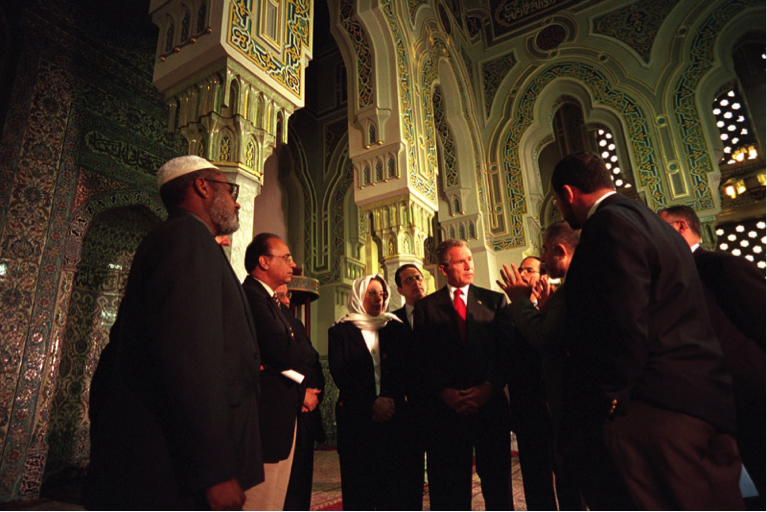George W. Bush’s Efforts to Dampen Anti-Muslim Anger After 9/11

When false rumors spread in the 1830s that Catholic priests had imprisoned a young woman in a Boston convent, a mob came and burned down the building. When false rumors spread during World War II that Jehovah’s Witnesses were plotting with the Nazis, Witnesses were beaten and castrated. When false rumors spread in 1838 that Mormons were plotting to take Missourians’ land, they were massacred.
So when the accurate news was reported in the days and weeks after September 11, 2001, that the terrorists were militant Muslims; that their leader, Osama bin Laden, had said, “We are the children of an Islamic Nation, with Prophet Muhammad as its leader, our Lord is one”; and that he had been given safe harbor in Afghanistan by a radical Islamic organization called the Taliban—it would not have been surprising if the people of the United States had blamed Islam. But when public opinion surveys were released in November 2001, they revealed a remarkable development: Americans had become more sympathetic to Islam. While in March 2001, 45 percent had a favorable opinion of Muslim Americans, after the attacks, 59 percent did. Favorable views about Muslims among conservative Republicans skyrocketed from 35 percent to 64 percent.70
In some ways, it was a vivid demonstration of how completely Americans had absorbed once-alien notions about religious tolerance. But much of the credit should go to President George W. Bush. His administration has been harshly criticized on many grounds, but Bush’s posture toward Islam in the months after the attack should rank among the greatest examples of leadership in the realm of religious freedom. When he heard reports of attacks on American Muslims, he recalled the internment of Japanese Americans during World War II, in part because his secretary of transportation, Norman Mineta, had been detained as a child.71
A few days after the attacks, Bush decided to visit a local mosque. On September 17, he entered the Islamic Center of Washington, took off his shoes, and walked into the prayer room. His statement began with the most elemental point: American Muslims, our neighbors, are grieving too. Therefore, Americans who harassed American Muslims were un- patriotic, he said. “Those who feel like they can intimidate our fellow citizens to take out their anger don’t represent the best of America, they represent the worst of humankind, and they should be ashamed of that kind of behavior.” Part of what made America great was, he said, its approach to religious freedom—its equal treatment of all its citizens.
Controversially, Bush described Islam as a great religion worthy of respect.
Islam is peace. These terrorists don’t represent peace. They represent evil and war. When we think of Islam we think of a faith that brings comfort to a billion people around the world. Billions of people find comfort and solace and peace. And that’s made brothers and sisters out of every race.
He would later be harshly criticized for the “Islam is peace” line, which anti-Muslim activists cited as an example of the US government’s blind- ness to Islam’s threat. But in that moment, Bush successfully set a tolerant tone. His strategic goal was to undermine the ability of the terrorists to cast the conflict as the West versus Islam. He wanted to assemble a coalition for the war in Afghanistan that would include Muslim countries. “Bush immediately understood [that] we could not get into a war with the Islamic world,” recalled Peter Wehner, one of Bush’s speechwriters. “You want to keep it from becoming a clash of civilizations.”
In Bush’s dramatic speech a few days later to a joint session of Congress, he spoke directly to Muslims around the world.
We respect your faith. It’s practiced freely by many millions of Americans, and by millions more in countries that America counts as friends.
Its teachings are good and peaceful, and those who commit evil in the name of Allah blaspheme the name of Allah. The terrorists are traitors to their own faith, trying, in effect, to hijack Islam itself.
Just as critics in earlier eras had suggested that Mormonism and Catholicism were inherently hostile to democracy, some argued that majority Muslim nations could not become civilized. Bush rejected that view: “It should be clear to all that Islam—the faith of one-fifth of humanity—is consistent with democratic rule.” Noting that more than half of Muslims live in democratic nations, he said, “A religion that demands individual moral accountability, and encourages the encounter of the individual with God, is fully compatible with the rights and responsibilities of self-government.”
Bush’s approach flowed not so much from a deep reading of Islamic history or theology as from an optimistic view of faith in general. Mus- lims, he said, “succeed in democratic societies, not in spite of their faith, but because of it.”
For a time, Bush’s strategy worked. The vast majority of Americans drew the distinction between Muslim terrorists and rank-and-file Muslim Americans. But this moment would soon pass.